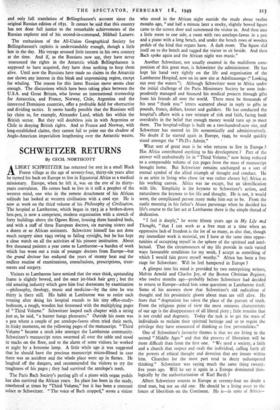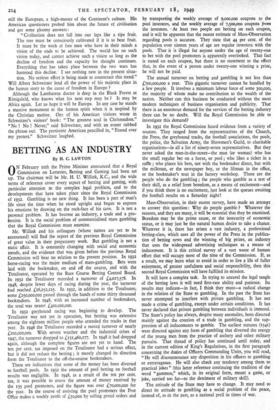SCHWEITZER RETURNS
By CECIL NORTHCOTT
ALBERT SCHWEITZER has returned for rest in a small Black Forest village at the age of seventy-four, thirty-six years after he turned his back on Europe to live in Equatorial Africa as a medical missionary. Europe, when he left it, was on the eve of its thirty- years convulsion. He comes back to live in it still a prophet of the western mind, one who hi the remote detachment of his African solitude has looked at western civilisation with a cool eye. He is now at work on the third volume of his Philosophy of Civilisation. The hospital at Lambarene, which began in 1913 in a broken-down hen-pen, is now a competent, modern organisation with a stretch of forty buildings above the Ogowe River, housing three hundred beds, and with a staff of three European doctors, six nursing sisters and a dozen or so African assistants. Schweitzer himself has not done much surgery since 1943 owing to failing eyesight, but he has kept a close watch on all the activities of his pioneer institution. About five thousand patients a year come to Lambarene—a burden of work which has worn out a train of younger doctors from Europe—but the grand docteur has endured the years of steamy heat and the endless routine of examinations, consultations, prescriptions, treat- ments and surgery.
Visitors to Lambarene have noticed that the once thick, upstanding frame is slightly bowed, and the once jet-black hair grey ; but the old amazing industry which gave him four doctorates by examination —philosophy, theology, music and medicine- by the time he was thirty is there still. His habit at Lambarene was to retire each evening after doing his hospital rounds to his tiny office-study- bedroom, a rough, wooden but festooned with the multiplying pages of " Third Volume." Schweitzer looped each chapter with a string just as, he said, " a hunter hangs pheasants." Outside his room was a pen where a couple of pet antelope-fawns often tried their teeth, in frisky moments, on the yellowing pages of the manuscript. " Third Volume" became a stock joke amongst the Lambarene community. Schweitzer's -manuscript notes swarmed all over the table and stood in stacks on the floor, and to the alarm of some visitors he worked at night by a kerosene lamp. A little while ago it was suggested that he should have the precious manuscript micro-filmed in case there was an accident and the whole place went up in flames. He laughed off the dangers, and recommended the visitors to try the toughness of his pages ; they had survived the antelope's teeth.
The Paris Bach Society's parting gift of a piano with organ pedals has also survived the African years. Its place has been in the study, smothered at times by "Third Volume," but it has been a constant solace to Schweitzer. " The voice of Bach stopped," wrote a visitor who stood in the African night outside the study about twelve months ago, " and half a minute later a stocky, slightly bowed figure came to the screen door and summoned the visitor in. And then into a little room to one side, a room with two antelope-fawns in a pen and a piano with a long bench, and under the bench rows of wooden pedals of the kind that organs have. A dark room. The figure slid itself on to the bench and tugged the visitor to sit beside. And then Bach spoke again and the African night was music."
Another Schweitzer, not usually counted in the multiform com- position of this great man, is Schweitzer the administrator. He has kept his hand very tightly on the life and organisation of the Lambarene Hospital, now on its new site at Adolinanongo (" Looking out over the waters "). Although Schweitzer went to Africa under the initial challenge of the Paris Missionary Society he soon inde- pendently managed and financed his medical projects through gifts from his friends all over the world. There must be thousands of his neat " thank you " letters scattered about in reply to gifts in pounds, francs, dollars, kroner and guilders. He has conducted the hospital's affairs with a rare mixture of risk and faith, facing bank overdrafts in the belief that enough money would turn up to meet them. The hospital-village is built on a two-hundred-acre site, and Schweitzer has steered its life economically and administratively. No doubt if he started again in Europe, rag% he would quickly stand amongst the "Ph.D.s Admin."
What sort of great man is he who returns to live in Europe ? Has Africa contributed anything to his development ? Part of the answer will undoubtedly lie in " Third Volume," now being reduced to a compassable volume of 250 pages from the mass of manuscript brought home. But Schweitzer remains unchanged as a sort of eternal symbol of the allied triumph of thought and conduct. He is an artist in living who chose (or was rather chosen by) Africa as his working canvas. Africa was no escape, but an identification with life. Simplicity is the keynote to Schweitzer's action, and naturalness the keynote to his life and thought. He is not, it would seem, the complicated person many make him out to be. From the sunlit morning in his father's Alsace parsonage when he decided his life's course to the last act at Lambarene there is the simple thread of dedication.
"I feel it deeply," he wrote fifteen years ago in My Life and Thought, "that I can work as a free man at a time when an oppressive lack of freedom is the lot of so many, as also that, though my immediate work is material, yet I have at the same time oppor- tunities of occupying myself in the sphere of the spiritual and intel- lectual. That the circumstances of my life provide in such varied ways favourable conditions for my work, I accept as something of which I would fain prove myself worthy." Africa has been a free stage for Schweitzer. Will he feel hampered in Europe ?
A glimpse into his mind is provided by two enterprising writers, Melvin Arnold and Charles Joy, of the Boston Christian Register, who twelve months ago—probably before Schweitzer had decided to return to Europe—asked him some questions at Lambarene itself. Some of his answers show that Schweitzer's old radicalism of thought and his pessimistic gloom about man are still alive. He fears that "dogmatism has taken the place of the pursuit of truth. From the religious point of view the most ominous characteristic of our age is the disappearance of all liberal piety ; little remains that is not credal and dogmatic. Today the task is to get the mass of individuals to reclaim their spiritual heritage and so to regain the privilege they have renounced of thinking as free personalities."
One of Schweitzer's favourite themes is that we are living in the second "Middle Ages" and that the process of liberation will be more difficult than from the first one. " We need a society, a faith and a church that respect and exalt the individual, calling forth all the powers of ethical thought and devotion that are innate within him. Churches for the most part tend to decry unhampered thinking." Schweitzer was saying much the same thing twenty- five years ago. Will he say it again in a Europe dominated theo- logically by the authoritarianism of Karl Barth ?
Albert Schweitzer returns to Europe at seventy-four no doubt a tired man, but not an old one. He should be a living asset to the forces of liberalism on the Continent. He is—in spite of Africa- still the European, a high-master of the Continent's culture. His American questioners probed him about the future of civilisation and got some gloomy answers: "Civilisation does not fall into our laps like a ripe fruit.
The tree must be consciously cultivated if it is to bear fruit. It must be the work of free men who have in their minds a vision of the ends to be achieved. The world has no such vision today, and cannot achieve such a vision so long as the decline of freedom and the capacity for thought continues. Everything that has taken place between the two wars has hastened this decline. I see nothing new in the present situa- tion. No serious effort is being made to counteract this trend."
Will Albert Schweitzer lend all the power of his majestic place in the human story to the cause of freedom in Europe ?
Although the Lambarene doctor is deep in the Black Forest at Konigsfeld, who knows what his next step may be ? It may be Africa again. Let us hope it will be Europe. In any case he stands a massive monument to the human spirit when it is inspired by the Christian motive. On of his American visitors wrote in Schweitzer's visitors' book: " The greatest soul in Christendom." "No ! No ! Never," said Schweitzer, and with an eraser rubbed the phrase out'. The persistent American pencilled in, "Erased over my protest." Schweitzer laughed.







































 Previous page
Previous page